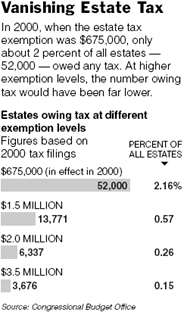Chart: Only .5% of US Estimated to Pay Estate Tax (and other op-eds for reform)
Category: Estate and Inheritance Tax
September 6 is when Congress comes back to take up the question of repeal of the Estate Tax. A recent report from the Congressional Budget Office shows that for all its publicity as the killer of small business, the federal estate tax impacts a miniscule portion of the population (see recent Y&Y post). From all my reading, my position is neither for or against repeal - instead, I question in what manner the lost revenue will be made up? One thing is for sure - the government needs money to operate, it currently doesn't have enough, and at some point the tax will be coming to all of us to make up the difference. If not through the estate tax, fine; but don't kid yourselves into thinking that when the dollars brought in through the estate tax go away that the need for those dollars will also go away.
Two recent op-eds questioning the need for repeal:
Death Tax? Double Tax? For Most, It's No Tax - New York Times

"A report last month by the Congressional Budget Office found that in 2000 only 2 percent of all estates - about 52,000 - were subject to any estate tax. At that point, taxes were imposed only on estates worth $675,000 or more. The limit rose to $1.5 million in 2004, and if that limit had been in effect in 2000, only 13,771 estates - fewer than 1 percent - would have been subject to the tax. All but 740 of them would have had enough in liquid assets to cover estate tax liabilities, the office estimated."
Fix Estate Tax, Don't Gut It - Wisconsin State Journal
"The federal estate tax ought to be reformed, but the super-rich should not get off virtually tax-free. That's why the Senate should adjust its aim as it works on a compromise reform plan."











